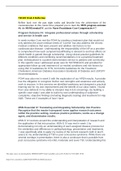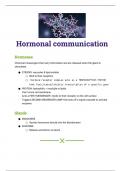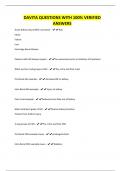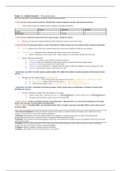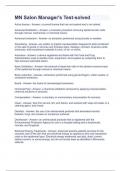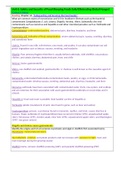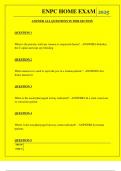Psychopathology glossary
Agoraphobia – irrational fear of being outside or in public places
Avoidance – the act of staying away from something
Basal ganglia – region of the brain involved in the coordination of movement
that been linked to OCD
Benzodiazepines – antianxiety drugs to treat OCD as they have quietening
effect on the brain and reduces anxiety caused by obsessive thoughts
Bipolar depression – condition where a person has periods of elevated mood as
well as periods of depression
Catastrophising – cognitive error where you exaggerate a minor setback and
trun it into a major disaster
CBT – Cognitive Behavioural Therapy is a commonly used therapy which involves
challenging and replacing irrational thoughts
Cognitive bias – error in thinking caused by simplified information processing
Compulsion – an irrational urge to behave in a certain way
COMT gene – gene which has a variation which results in higher levels of
dopamine and this variation is more common in patients with OCD
Counter-conditioning – learning a new response to the phobic object/situation
Cultural relativism – the idea that cultural norms and values are culture specific
and no-one culture is superior to another culture
Deviation from ideal mental health – not meeting criteria which suggest you
are mentally healthy
Deviation from social norms - a behaviour that is very different from how we
would expect people to behave
Dopamine – higher levels of this neurotransmitter have been associated with
compulsions shown by OCD patients
DSM-V – Diagnostic and Statistical Manual Disorders, Fifth Edition is the
standard classification of mental disorders used in the United States
Empirical dispute – REBT technique where the therapist seeks evidence for a
person’s thoughts
Failure to function adequately – when a person’s behaviour means they are
unab;le to cope with demands of everyday life
Fear hierarchy – a list of situations related to the phobic object/situation
arranged in order from least to most frightening
Agoraphobia – irrational fear of being outside or in public places
Avoidance – the act of staying away from something
Basal ganglia – region of the brain involved in the coordination of movement
that been linked to OCD
Benzodiazepines – antianxiety drugs to treat OCD as they have quietening
effect on the brain and reduces anxiety caused by obsessive thoughts
Bipolar depression – condition where a person has periods of elevated mood as
well as periods of depression
Catastrophising – cognitive error where you exaggerate a minor setback and
trun it into a major disaster
CBT – Cognitive Behavioural Therapy is a commonly used therapy which involves
challenging and replacing irrational thoughts
Cognitive bias – error in thinking caused by simplified information processing
Compulsion – an irrational urge to behave in a certain way
COMT gene – gene which has a variation which results in higher levels of
dopamine and this variation is more common in patients with OCD
Counter-conditioning – learning a new response to the phobic object/situation
Cultural relativism – the idea that cultural norms and values are culture specific
and no-one culture is superior to another culture
Deviation from ideal mental health – not meeting criteria which suggest you
are mentally healthy
Deviation from social norms - a behaviour that is very different from how we
would expect people to behave
Dopamine – higher levels of this neurotransmitter have been associated with
compulsions shown by OCD patients
DSM-V – Diagnostic and Statistical Manual Disorders, Fifth Edition is the
standard classification of mental disorders used in the United States
Empirical dispute – REBT technique where the therapist seeks evidence for a
person’s thoughts
Failure to function adequately – when a person’s behaviour means they are
unab;le to cope with demands of everyday life
Fear hierarchy – a list of situations related to the phobic object/situation
arranged in order from least to most frightening




